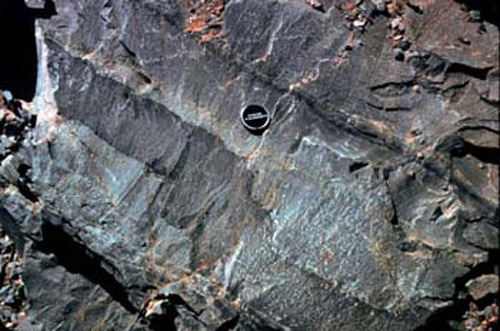Lecture 6 Image Gallery
lec3photo12.jpg
Description:
As you move up through the oceanic crust, you leave the magma chamber and enter the sheeted dike complex. This region is composed of a collection of vertically-oriented basalts in dikes, but there are so many that this region is almost entirely composed of dikes. In this image you can see one of these darker dikes cutting up and left though a basaltic rock that is just composed of dikes itself. The darker rocks are along the dike margins due to rapid cooling against lighter-colored rocks near the middle of a previously intruded dike. The extension responsible for creating the fractures that the dikes travel up is due to the tectonic instability of the region adjacent to the mid-ocean ridge. Image courtesy of Professor Burchfiel.
file
71 kB
lec3photo12.jpg
Alt text:
Sheeted dike complex.
Caption:
As you move up through the oceanic crust, you leave the magma chamber and enter the sheeted dike complex. This region is composed of a collection of vertically-oriented basalts in dikes, but there are so many that this region is almost entirely composed of dikes. In this image you can see one of these darker dikes cutting up and left though a basaltic rock that is just composed of dikes itself. The darker rocks are along the dike margins due to rapid cooling against lighter-colored rocks near the middle of a previously intruded dike. The extension responsible for creating the fractures that the dikes travel up is due to the tectonic instability of the region adjacent to the mid-ocean ridge.
Credit:
Image courtesy of Professor Burchfiel.

Course Info
Instructors
Departments
As Taught In
Fall
2005
Level
Learning Resource Types
collections
Image Gallery
assignment
Activity Assignments









